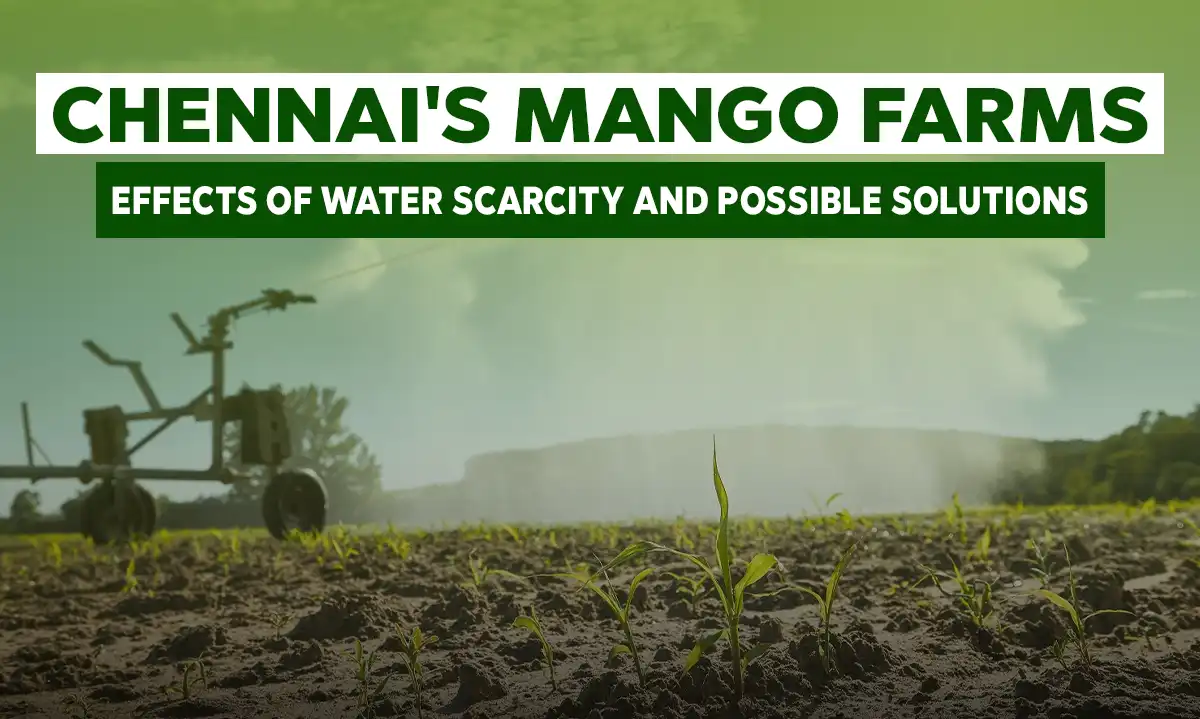Chennai Mango Farms vs. Water Scarcity: Effective Management Solutions

Introduction
Chennai, the vibrant capital of Tamil Nadu, is renowned for its diverse agricultural landscape, including its thriving mango farms. Mangoes, often celebrated as the "king of fruits," hold significant cultural and economic value in the region. However, Chennai’s mango farms are increasingly facing a critical challenge: water scarcity. With the city experiencing fluctuating rainfall patterns and prolonged dry spells, managing water resources has become essential for sustaining mango cultivation. This blog explores the profound effects of water scarcity on Chennai's mango farms and examines practical solutions to address this pressing issue. By understanding the impact of water scarcity and exploring effective strategies, farmers can better navigate the challenges and ensure a fruitful mango harvest.
Water Needs's Impact on Mango Legacies
1.Lower Yields of Mangoes: Water is essential for mango trees' optimal development. For these trees to maintain their health and productivity, they require a consistent and sufficient water supply. A shortage of water can significantly impact mango harvests. When water is scarce, mango trees may not produce as expected, leading to delayed maturation and reduced fruit production. This directly affects the quantity of mangoes harvested, potentially leading to reduced income for farmers. Lower yields mean fewer mangoes available for sale, which could contribute to a decrease in market demand for mango farmland.
2.Diminished Quality of Mangoes: Water stress also affects mango quality. Mangoes grown under insufficient water conditions are often characterized by irregular growth, poor color, and diminished flavor. Consumers seek mangoes that are vibrant, sweet, and succulent. If mangoes fail to meet these quality standards due to water stress, they may not sell well in the market. Quality issues can negatively impact the farm’s overall profitability and market reputation.
3.Increased Pest and Disease Pressure: Mango trees under stress from water shortages are more susceptible to pests and diseases. Mango trees under water stress become more vulnerable to common pests like scale insects, fruit flies, and fungal infections. These issues can further compromise the yield and quality of mangoes, creating a vicious cycle that affects farm productivity and profitability. Effective pest and disease management becomes critical in maintaining the health of mango farmland under water scarcity conditions.
4.Degraded Soil Health: The lack of water negatively impacts soil health as well. Insufficient moisture can lead to soil compaction and reduced fertility. Compacted soil has less capacity to retain water, which further affects mango tree growth. Over time, poor soil conditions can make it increasingly difficult to cultivate mangoes on specific farmland, requiring additional attention to soil improvement and rehabilitation.
Possible Solutions to Address Water Scarcity
1.Implementing Drip Irrigation Systems: Drip irrigation is one of the most effective methods for managing water resources efficiently. This system delivers water directly to the root zone of mango trees through a network of tubes and emitters. Drip irrigation reduces water waste and improves water use efficiency, supporting healthy tree growth and fruit production. With consistent and targeted water application, farmers can maintain productivity and quality in their mango farmland, even during dry periods.
2.Adopting Water Harvesting Techniques: Water harvesting techniques can help manage and store water for use during dry spells. Systems like rainwater harvesting pits and storage tanks can capture and store excess water during the rainy season. This stored water can be used to irrigate mango farmland during droughts, reducing dependency on external water sources and mitigating the effects of water scarcity.
3.Utilizing Mulching: Mulching is an important practice for conserving soil moisture and enhancing soil health. Applying organic materials like straw, leaves, or compost around the base of mango trees creates a protective layer that reduces evaporation, regulates soil temperature, and suppresses weed growth. Mulching improves soil's water-holding capacity, helping mango trees withstand dry conditions better.
4.Improving Soil Management: Proper soil management is crucial for maintaining soil health and water retention. Techniques such as soil enrichment with organic matter, soil conservation practices, and the use of cover crops can improve soil structure and fertility. Healthy soil supports better water absorption and retention, which is vital for mango farmland during periods of water scarcity.
5.Selecting Drought-Resistant Mango Varieties: Certain mango varieties are better suited to withstand dry conditions and can perform well in water-scarce environments. Farmers should explore and select mango cultivars known for their drought resistance and adaptability. Consulting with agricultural experts and researching the best-performing varieties for Chennai’s water conditions can help in making informed choices for mango farmland.
6.Educating Farmers and Promoting Best Practices: Education and training are essential for farmers to implement effective water management strategies. Providing resources and knowledge about advanced irrigation techniques, water conservation practices, and soil management can empower farmers to adapt to water scarcity challenges. Workshops, extension services, and agricultural programs can support farmers in adopting best practices and enhancing their resilience to water-related issues.
Conclusion
In the face of escalating water scarcity, Chennai’s mango farms must adapt and innovate to maintain productivity and fruit quality. The challenges posed by limited water resources affect not only the quantity and quality of mangoes but also the overall health of the farming ecosystem. However, by adopting effective solutions such as drip irrigation, rainwater harvesting, mulching, and improved soil management, farmers can mitigate these impacts and enhance their resilience. Selecting drought-resistant mango varieties and investing in farmer education further supports sustainable practices.
Latest blogs
JOIN OUR COMMUNITY !
Stay connected with Getfarms! Follow us on social media for the latest updates, exclusive offers, and a glimpse into the world of farmhouse living. Join our community today




























